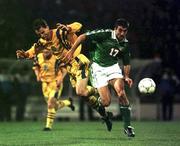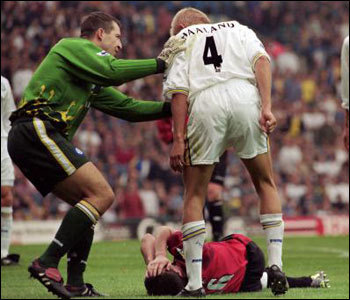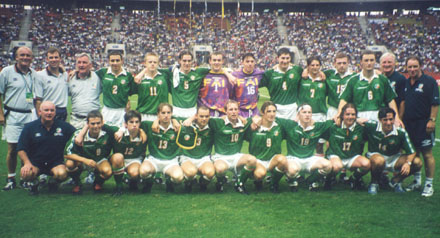In January 1996, Mick McCarthy was appointed as manager of the Irish senior international team, edging out Kevin Moran on a contentious 3-2 vote. Despite names such as Johan Cruyff, Bobby Robson, Joe Kinnear and Kenny Dalglish being tenuously linked with the post at various times, the two final candidates were somewhat underwhelming; Moran had no managerial experience whatsoever, yet still pushed the more seasoned McCarthy all the way in the voting.
 McCarthy inherited an ageing squad; the likes of Paul McGrath, John Sheridan and John Aldridge - key players in the Euro '96 qualifiers - would not feature significantly in the upcoming campaign. For veterans Andy Townsend and Ray Houghton, both approaching their mid-thirties, France '98 would represent a final opportunity to reach a major tournament. These familiar faces from the Charlton era would need to be replaced over time, and McCarthy used a tough series of friendlies to blood new players, mostly drawn from unfashionable Premiership reserve and second-tier sides. In his first eighteen months in charge, McCarthy gave first-team débuts to thirteen players, of whom only Shay Given, Ian Harte, Kenny Cunningham, Gary Breen and David Connolly became regulars in the long-run. Given the experimental nature of those early friendlies, an exasperating injury list, and the introduction of an irregular 3-5-2 formation, Ireland struggled - losing to Russia, Czech Republic, Portugal, Holland and the USA in early 1996. To add to the sense of chaos, Roy Keane inadvertently absented himself from the US Cup excursion that summer after a communication breakdown with McCarthy, resulting in a short exile from the squad and lingering doubts about his commitment. On the up-side, McCarthy was encouraging his players to pass the ball and build from the back, in marked contrast to his predecessor.
McCarthy inherited an ageing squad; the likes of Paul McGrath, John Sheridan and John Aldridge - key players in the Euro '96 qualifiers - would not feature significantly in the upcoming campaign. For veterans Andy Townsend and Ray Houghton, both approaching their mid-thirties, France '98 would represent a final opportunity to reach a major tournament. These familiar faces from the Charlton era would need to be replaced over time, and McCarthy used a tough series of friendlies to blood new players, mostly drawn from unfashionable Premiership reserve and second-tier sides. In his first eighteen months in charge, McCarthy gave first-team débuts to thirteen players, of whom only Shay Given, Ian Harte, Kenny Cunningham, Gary Breen and David Connolly became regulars in the long-run. Given the experimental nature of those early friendlies, an exasperating injury list, and the introduction of an irregular 3-5-2 formation, Ireland struggled - losing to Russia, Czech Republic, Portugal, Holland and the USA in early 1996. To add to the sense of chaos, Roy Keane inadvertently absented himself from the US Cup excursion that summer after a communication breakdown with McCarthy, resulting in a short exile from the squad and lingering doubts about his commitment. On the up-side, McCarthy was encouraging his players to pass the ball and build from the back, in marked contrast to his predecessor.1996 was a time of huge transition for Ireland, but also a period of upheaval for the domestic game in England, where the best Irish players traditionally plied their trade. Expensive, high-profile foreign imports such as Vialli, Zola, Juninho and Ravanelli were making a huge impact in the Premiership, while the hype surrounding the successful Euro '96 tournament, and the growing cult of footballing celebrity - embodied by the 21-year-old David Beckham - was bringing unprecedented levels of media focus, glamour and resulting sponsorship into the English game. Over the coming years, enormous amounts of money would be pumped into the Premiership, following a European trail blazed by Manchester United in their relentless quest for Champions League success. The growing Continental influence could be seen in Arsenal's ground-breaking appointment of Arsene Wenger. From 1996 onwards, it would be increasingly difficult for Irish players to break into the top Premiership sides.
Ireland enjoyed a painless introduction to the World Cup qualifiers, having been drawn in a favourable group. The top seeds, Romania, had made little impression in Euro '96, and the also-rans - Iceland, Lithuania, Macedonia and Liechtenstein - had never even come close to qualifying for major tournaments before. Ireland swept Liechtenstein aside 5-0 in Vaduz, and impressively beat Macedonia 3-0 at HQ, showcasing McCarthy's new, more expressive style of play. However, the first hiccup came in the November game at home to Iceland; Roy Keane returned, and McCarthy chose to deploy the Corkman as a sweeper in the back three. Devoid of creativity in midfield and toothless up front, Ireland succumbed to a scoreless draw, handing the initiative in the group to Romania.
 After a 0-0 friendly draw away to Wales, further cracks were beginning to appear in McCarthy's gameplan and selections. First, Paul McGrath was ejected from the squad for a breach of discipline, in circumstances which reflect poorly on McCarthy's approach to the defender's long-standing personal problems. Another bone of contention was the manager's favoured 3-5-2 formation. The uncomfortable deployment of McAteer and Phelan as wing-backs, along with Irwin and Staunton as proxy centre-backs, was compounding the failure of Phil Babb to step up as a senior member of the defence. A disaster was waiting to happen, and it duly arrived on a grim Skopje afternoon, which goes into the annals as one of Irish football's darkest days. Despite taking the lead against Macedonia through Alan McLoughlin, the wing-backs conceded a penalty each, both converted by Stojkovski. Ireland's ramshackle defence allowed the counter-attacking Georgi Hristov to run through for a third in the second half. A David Kelly consolation came too late for a comeback, and Ireland's frustration was demonstrated by McAteer's needless sending-off, which ruled him out of the following Wednesday's daunting trip to Bucharest.
After a 0-0 friendly draw away to Wales, further cracks were beginning to appear in McCarthy's gameplan and selections. First, Paul McGrath was ejected from the squad for a breach of discipline, in circumstances which reflect poorly on McCarthy's approach to the defender's long-standing personal problems. Another bone of contention was the manager's favoured 3-5-2 formation. The uncomfortable deployment of McAteer and Phelan as wing-backs, along with Irwin and Staunton as proxy centre-backs, was compounding the failure of Phil Babb to step up as a senior member of the defence. A disaster was waiting to happen, and it duly arrived on a grim Skopje afternoon, which goes into the annals as one of Irish football's darkest days. Despite taking the lead against Macedonia through Alan McLoughlin, the wing-backs conceded a penalty each, both converted by Stojkovski. Ireland's ramshackle defence allowed the counter-attacking Georgi Hristov to run through for a third in the second half. A David Kelly consolation came too late for a comeback, and Ireland's frustration was demonstrated by McAteer's needless sending-off, which ruled him out of the following Wednesday's daunting trip to Bucharest. Romania, boasting the talents of the veteran Hagi, had breezed through their opening fixtures with a 100 per cent record, and were five points clear going into Ireland's visit. McCarthy had some serious reshuffling to do, and was forced to revert to a flat back four, restoring Irwin and Staunton to their rightful full-back positions, bringing in Cunningham alongside Harte at centre-back, and playing Connolly as a lone striker. A much-improved performance should have yielded more than a 1-0 defeat, but when Houghton was taken down in the box, Roy Keane's penalty was saved. Eight points behind the Romanians, Ireland would be playing for second place in the group, a fact unchanged by a 5-0 win over Liechtenstein in May. David Connolly scored a hat-trick in that game, and his eye-catching international form was rewarded with a move to Feyenoord in the close-season.
Romania, boasting the talents of the veteran Hagi, had breezed through their opening fixtures with a 100 per cent record, and were five points clear going into Ireland's visit. McCarthy had some serious reshuffling to do, and was forced to revert to a flat back four, restoring Irwin and Staunton to their rightful full-back positions, bringing in Cunningham alongside Harte at centre-back, and playing Connolly as a lone striker. A much-improved performance should have yielded more than a 1-0 defeat, but when Houghton was taken down in the box, Roy Keane's penalty was saved. Eight points behind the Romanians, Ireland would be playing for second place in the group, a fact unchanged by a 5-0 win over Liechtenstein in May. David Connolly scored a hat-trick in that game, and his eye-catching international form was rewarded with a move to Feyenoord in the close-season.The jury was still out on McCarthy by the summer of 1997, despite the FAI granting a public vote of confidence. Mishandling of personal issues with Keane and McGrath, added to some bizarre decisions in terms of formation and team selection, and the manager seemed to be on thin ice. However, Ireland had been beset with injuries since the beginning of the qualifiers, notably long-term absences for Gary Kelly and Niall Quinn, which disrupted any attempts to field a settled side. The abject form of Babb and McAteer - Liverpool regulars and two of Ireland's most high-profile players - was also a big disappointment. However, there were some chinks of light - Brian Kerr's U-20s came third in the FIFA World Youth Cup in Malaysia in the summer of 1997, eliminating Spain en route before narrowly losing to an Argentinian side containing Samuel, Cambiasso, Aimar and Riquelme. Blackburn's Damien Duff was earmarked as a future star, while Tottenham's Neale Fenn was rewarded with a senior call-up for the home qualifier against Lithuania in August.
 |
| Keane suffers his season-ending injury at Elland Road |
The playoff draw was relatively kind to Ireland, avoiding the heavily favoured Italy, Russia, Croatia and Yugoslavia. Ireland's tie with Belgium was regarded as the 'cripple fight' of the playoffs, as Belgium were in transition under George Leekens, having failed to qualify for Euro '96. McCarthy made a strange call in his tactics for the first leg at Lansdowne Road, deploying Kennedy in a free role behind Cascarino and Connolly, with Staunton in midfield, in a 4-3-1-2 set-up. The plan worked for the opening ten minutes, as Ireland took the lead through a fantastic Irwin free-kick, but the home team was soon overrun in midfield, and Nilis fired a precious away goal on the half-hour. Belgium went on to dominate the game, and a 1-1 draw was flattering to McCarthy's faltering side. The manager came in for criticism, particularly for fielding Ian Harte as a makeshift centre-back, and for the lop-sided midfield, where Kennedy - a favourite of McCarthy's from his Millwall days - had been wholly ineffective.
Ireland were given little hope of overturning Belgium's advantage, and McCarthy reverted to a 4-5-1, with McLoughlin and newcomer Lee Carsley brought in to stiffen up the midfield. Accordingly, Ireland turned in a much-improved performance in the Brussels rain, but were caught with a counter-attack on 25 minutes, when Oliveira capitalised on Given's misreading of a through ball. Ireland persevered, and grabbed a deserved equaliser through Houghton with half an hour left to play. Momentum was in Ireland's favour, but ten minutes later, Nilis - effectively man-marked by Carsley all night - took advantage of some sloppy play - and the non-awarding of a rightful Irish throw-in - to evade his marker and slot home. A further away goal would have seen Ireland through regardless of Nilis's strike, however, and McCarthy threw caution to the wind, bringing on Connolly for Kennedy. However, the young striker aimed a petulant kick at Verheyen, and was duly sent off. Belgium comfortably played out the final minutes against Ireland's ten men, and tears were shed at the final whistle.
 |
When interviewed after the final whistle, McCarthy voiced
his grievance with regard to the lead-up to Nilis's goal: "It was
definitely our throw, but that decision, when we were on top, cost us a place
in the World Cup. Now I've said my piece about it, and don't want to discuss it
any more, but I am unhappy with it, even though we could have defended better
against the throw-in. The result obviously feels like the worst moment of my
career right now. But with the sense of sorrow there is also a feeling of pride
and hope about our performance.' Leekens was probably more on the mark when he
played down the incident, and suggested that Ireland had really lost the tie in
Dublin, when McCarthy's bizarre reshuffle in midfield caused the team to lose
their grip on a winnable tie.
In retrospect, a more seasoned manager than McCarthy could
have successfully navigated what was, on paper, a relatively easy group.
McCarthy's tactical naivety, and a seeming indecision about his preferred
starting line-up, contributed to a lack of momentum, organisation and
confidence within the Irish side. Had Ireland not dropped such careless points
against Iceland, Lithuania and Macedonia, they could have qualified for France
'98 as best runners-up. However, injuries also played a huge part in the
campaign, and Ireland relied heavily at times on the likes of Townsend and
Houghton, who were not the forces of old at international level. The lack of a
prolific striker, and the absence of real pace and creativity in the wide positions,
were glaring weaknesses. Expensive Liverpool players McAteer and Kennedy had been found wanting in the latter regard, and though young strikers Connolly and
Keith O'Neill had started brightly in the initial friendlies, Connolly's form
tailed off after his ill-fated Dutch move, and O'Neill's injuries would, in time, force
his premature retirement. Ireland's striking dilemma was exemplified by the
continuing presence of Cascarino, Coyne and David Kelly - strikers with a
combined age of 102. However, there were a couple of prospects coming along - 18-year-old Damien Duff had followed his youth-level heroics by breaking into Blackburn's
first team, and there were encouraging reports about an exciting 17-year-old
striker at Wolves. Though McCarthy had made mistakes, the FAI's decision to hire an up-and-coming ex-player instead of a more experienced manager was borne of an understanding that the incumbent would learn 'on the job'. McCarthy was generally respected within the dressing-room, it seemed, and the away leg of the playoff had shown signs of progress. If he could learn from his mistakes, keep the young players coming through, and maintain Ireland's improvement into the next campaign, all the better. Brighter days were surely to come for McCarthy and his evolving side.
Ireland 3-0 Macedonia, 1996
Macedonia 3-2 Ireland, 1997
Romania 1-0 Ireland, 1997
Ireland 1-1 Belgium (Playoff first leg)
Belgium 2-1 Ireland (Playoff second leg)


No comments:
Post a Comment